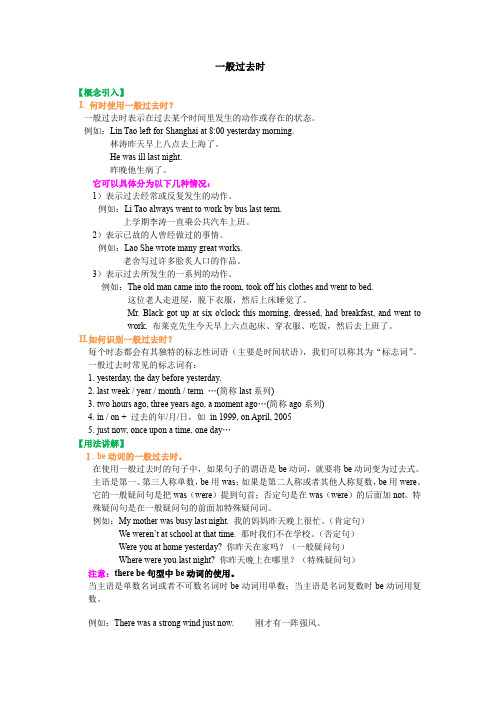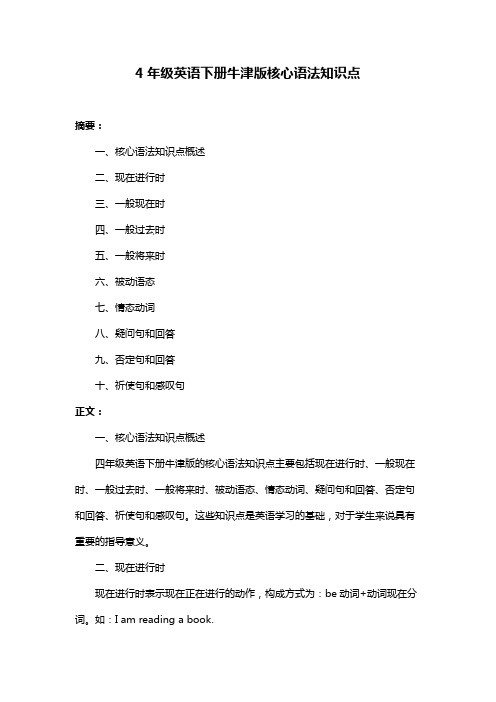苏教版小学牛津英语时态语法总结
牛津英语英语语法一般现在时

牛津英语英语语法(三)一般现在时一. 一般现在时行为动词词型变化形式一般现在时动词只有第三人称有词形变化,其他人称动词均用原形单数第三人称动词变化:多数在动词后加s play—plays like—likes ,以s,x,sh,ch,o结尾的动词加es go—goes wash--washes,以辅音字母加y结尾,把y改i再加es fly—flies study--studies二. 一般现在时动词be和have的变化形式1.动词Be 叫连系动词, 连系动词be的用法:除了第一人称单数用am,和第三人称单数用is以外,其它人称用are。
I am busy. You are busy. He (She) is busy. We (You, They) are busy.2.动词have的用法:除了第三人称单数用has以外,其它人称一律用have。
如:I have a pen. You have a pen. She (He) has a pen.We (You, They) have pens.三. 一般现在时的句型1.肯定句构成:主语+动词(注意人称变化) +其它成分Ihave a dog. We like the little cat. She sings well.2.否定句构成:行为动词的否定句:主语+助动词(do/does) + not +动词原形+其它成分He dosen’t have a dog.He isn’t young.We don’t like the little cat.(借助于助动词do) She doesn’t sing well. (借助于助动词does)3.一般疑问句:A.行为动词的一般疑问句:助动词(do/does)+主语+动词原形+ 其它成分Do you like i t? Yes, I do. / No. I don’t .Does he(she) like it? Yes, he( she )does. / No, he ( she )doesn’t.B. 动词BE 的一般疑问句Am / Is /Are +主语+ 其它成分Are you a teacher? Yes, I am. / No, I am not.Are they students of your school.Yes they are / No they aren,t.4.特殊疑问句:特殊疑问词+ 一般疑问句How many students are there in your school?What do you usually do on Sunday?四.一般现在时的用法1.经常性或习惯性的动作,常与表示频度的时间状语连用。
牛津小学英语3A--6B语法总结

3A - 6B Grammar1. 人称代词主格:I we you she he it they宾格:me us you her him it them 形容词性物主代词:my our your her his its their 名词性物主代词:mine ours yours hers his its theirs2. 形容词和副词的比较级(1) 一般在形容词或副词后+er older taller longer stronger, etc(2) 多音节词前+more more interesting, etc.(3) 双写最后一个字母,再+er bigger fatter, etc.(4) 把y 变i ,再+er heavier, earlier(5) 不规则变化:well-better, much/many-more, etc.3. 可数词的复数形式Most nouns + s a book - booksNouns ending in a consonant +y - y+ ies a story —storiesNouns ending in s, sh, ch or x + es a glass —glasses a watch-watchesNouns ending in o +s or +es a piano —pianos a mango —mangoesNouns ending in f or fe - f or fe +ves a knife - knives a shelf-shelves4. 不可数名词( 单复数形式不变)bread, rice, water ,juice etc.5. 缩略形式I 'm = I am you 're = you are she 's = she is he 's = he is it 's = it is who 's =who is can 't =can not isn 't=is not etc6. a/ana book, a peachan egg an hour7. Preposition:on, in ,in front of, between, next to, near, beside, at, behind. 表示时间:at six o 'clock, at Christmas, at breakfast on Monday on 15th July On National Day in the evening in December in winter8. 基数词和序数词one —first two-sec ond twen ty-twe ntieth9. Some /anyI have some toys in my bedroom.Do you have any brothers or sisters?10. be 动词(1) Basic form: am/are/is(2) 肯定和否定句I am(not) from London.My eyes are(not) small.My hair is(not) long.( 3)一般疑问句:Am I a Chniese? Yes, you are. No, you aren 't. Are they American? Yes, they are. No, they aren 't.Is the cat fat? Yes, it is. No, it isn 't.11. there be 结构肯定句:There is a ,There are ,一般疑问句:Is there ,? Yes, there is./ No, there isn 't.Are there,? Yes, there are. /No, there aren 't.否定句:There isn 't ,. There aren 't,.12. 祈使句Sit down pleaseDon't sit down, please.13. 现在进行时.通常用“ now”.形式:be + verb +ingeg: I am(not) doing my homework.You/We/They are(not) reading.He/She/It is(not) eating.动词—ing 的形式Most verbs +ing walk —walkingVerbs ending in e -e + ing come —comingShort verbs ending in a vowel + a consonant run - running swim—swimming14 一般现在时。
牛津小学四大时态概念+Ben的故事背诵

现在进行时
(正在做的事)
I write English every day. Do you write English every day?
I wrote a diary yesterday. Did you write a diary yesterday?
I will write a letter tomorrow. Will you write a letter tomorrow? Are you going to write a letter tomorrow? I am writing some words now. Are you writing any words now?
now , listen , look, … o’clock
行为动词的四大时态 一般现在时
(经常做的事)
I write English every day. I, you, we , they 动词原形 he , she , it 动词三单+s
I wrote a diary yesterday. 主语 + 动词+ ed
be 的四大时态 一般现在时
(现在的一种状态)
I am happy today.
一般过去时
(表示过去的一种状态)
I was tired yesterday.
一般将来时
(表示将来பைடு நூலகம்一种状态)
I will be busy tomorrow.
现在进行时
(紧跟着主语)
I am speaking English.
Ben 的故事
Ben is a middle school student . He lives in Nanjing.
六年级下册英语知识点苏教版

六年级下册英语知识点苏教版1.语法知识:
-动词时态:一般现在时、一般过去时、将来时
-名词:可数名词和不可数名词的用法、名词所有格
-形容词和副词的比较级和最高级
-基本句型和疑问句
-情态动词的用法
2.词汇积累:
-动词、形容词和副词的常见词汇
-食物、家庭、交通工具、节日等话题相关的词汇
-数字、时间、日期、星期等基本词汇
-人称代词、物主代词、疑问代词、指示代词等
3.句型和表达:
-描述人物外貌和性格特点
-谈论喜欢和不喜欢的事物
-表达能力和日常活动
-向他人提出请求和邀请
-谈论过去和将来的计划
4.阅读理解:
-短文阅读理解,包括填空、选择和判断题型
-根据短文内容回答问题
-根据短文内容完成句子
以上是六年级下册英语知识点的概述,具体的教材内容可能会有所不同。
建议根据实际教材进行更详细的学习和复习。
小学牛津英语四种时态比较

牛津英语四种时态解析1 / 5附:1.不规则动词过去式Sweep--swept teach –taught have-- had go --wentkeep-- kept think-- thought do--did find-- foundsleep--slept buy-- bought eat-- ate say --saidfeel --felt drink-- drank is/am—was take-- tookread-- read give-- gave are --were mean --meantput –put sing sang drive—drove meet --metcut --cut begin-- began speak-- spoke make-- madelet --let ring-- rang write --wrote see --saw2 / 5fly --flew run --ran ride –rode come-- camedraw --drew sit-- sat hear --heard tell --toldgrow –grew get --got know –knew learn --learned/learnt时态综合练习一、用所给动词的适当形式填空1.Tom and Mary ___________ (come) to China last month.2.Mike _________________(not go) to bed until 12 o’clock last night. So I _______ (get ) up late.3.Mary __________ (read) English yesterday morning.4.There _________ (be) no one here a moment ago.5.I ___________ (call) Mike this morning.6.I listened but ___________ (hear) nothing.7.Tom ___________ (begin) to learn Chinese last year.st week we _________ (pick) many apples on the farm.9.My mother ________________ (not do) housework yesterday.10.She watches TV every evening. But she _______________ (not watch) TV last night.11.________ your father ________ ( go ) to work every day last year?12. —What time _______ you _______ (get) to Beijing yesterday? —We __________ (get) to Beijing at 9:00 in the evening.13.What __________ (make) him cry (哭) just now?st year the teacher ___________ (tell) us that the earth moves around the sun.15.There ____________ a telephone call for you just now. (be)16.There __________ not enough people to pick apples that day. ( be)17.There _____________ any hospitals (医院) in my hometown (家乡) in 1940. ( be not)18.There ____________ enough milk at home last week, wasn’t there?19. 19.Eli ____________ to Japan last week. ( move)3 / 520.–When _______ you _________ (come) to China? - Last year.21.Did she ________ (have) supper at home?22.Jack ____________ (not clean) the room just now.23._________ (be) it cold in your city yesterday?24.How many people ________ (be) there in your class last term?25.It ________ (be) hot yesterday and most children _______ (be) outside26. There ________ (be) a football match on TV yesterday evening, but I _________ (have) no time to watch it.27. He ate some bread and _________ (drink) some milk.28. ________ he __________ (finish) his homework last night?29. I__________(be) tired yesterday.30. I ___________(gain ) Arts degree last year.31. What _________ you ___________ (do) last night?32. My grandfather _________ (leave) Hong Kong for New York in 1998.33. What _______ he ________ (do) yesterday?34. Last week I _______ (buy) a new bike.35. He ________ (be) here just now.36. He __________ (not find ) his key last night.37. My father __________ (drink) a lot of wine yesterday.38. ________ you ________ (finish) your homework yesterday?39. I ________ (eat) some eggs and bread this morning.40. Her mother __________ (not give) the girl any present.41.The buses ______ (use) a lot of oil.42.My daughter _________ (watch) TV every day. Sometimes she _______ (see) a film on Sunday.43.Li Wei ________ (have) a daughter.44.Her mother ___________ (teach) English at a middle school.45.Jack often ___________ (listen) to the radio.46.He ________ (say) that Li Lei is tired.47.Tom and Mary ___________ (come) to China last month.48.Mike _________________(not go) to bed until 12 o’clock last night. So I _______ (get ) up late.4 / 549.Mary __________ (read) English yesterday morning.50.There _________ (be) no one here a moment ago.51.I ___________ (call) Mike this morning.52.I listened but ___________ (hear) nothing.53.Tom ___________ (begin) to learn Chinese last year.st week we _________ (pick) many apples on the farm.55.My mother ________________ (not do) housework yesterday.56.She watches TV every evening. But she _______________ (not watch) TV last night.57.________ your father ________ ( go ) to work every day last year?58.—What time _______ you _______ (get) to Beijing yesterday? —We __________ (get) to Beijing at 9:00 in the evening.59.What __________ (make) him cry (哭) just now?st year the teacher ___________ (tell) us that the earth moves around the sun.5 / 5。
牛津版英语时态讲解(共42张PPT)

三、现在进行时: (The Present Continuous Tense)
Conclusion
1.结构: be (am, are, is) + doing
2. 用法: 1) 表示现在( 指说话时)正在发生的事情。 eg. We are having English class now. 2) 表示目前这段时间内正在进行的动作,但说 话时动作未必正在进行。
间,持续到现在, 通常用于延续性动词. 常与 表示延续性时间状语连用,如:so far, up to now, recently, in the past 6 years, since…, for… 等等.
eg. I have lived in Zhuhai for 3 years.
2).表示发生在过去的某一动作对现在造成的影响 或结果,常用的时间状语有: just ,already, yet, ever, never, once等等.
eg. We have finished our lunch already. Have you ever tried this method?
- The couple have just left. If you hurry you will catch them.
- You mean when I arrived they _h_a_d_ just _l_ef_t_.
sometimes I _m__i_s_s my families.
Conclusion
一、一般现在时:( The Simple Present Tense)
1.结构: 主语为第三人称单数,谓语动词要变
化,其余人称用原形,即do / does.
2. 用法:
2020-2021 苏教版牛津英语六年级上册一般过去时讲解

一般过去时【概念引入】I. 何时使用一般过去时?一般过去时表示在过去某个时间里发生的动作或存在的状态。
例如:Lin Tao left for Shanghai at 8:00 yesterday morning.林涛昨天早上八点去上海了。
He was ill last night.昨晚他生病了。
它可以具体分为以下几种情况:1)表示过去经常或反复发生的动作。
例如:Li Tao always went to work by bus last term.上学期李涛一直乘公共汽车上班。
2)表示已故的人曾经做过的事情。
例如:Lao She wrote many great works.老舍写过许多脍炙人口的作品。
3)表示过去所发生的一系列的动作。
例如:The old man came into the room, took off his clothes and went to bed.这位老人走进屋,脱下衣服,然后上床睡觉了。
Mr. Black got up at six o'clock this morning, dressed, had breakfast, and went towork. 布莱克先生今天早上六点起床、穿衣服、吃饭,然后去上班了。
II.如何识别一般过去时?每个时态都会有其独特的标志性词语(主要是时间状语),我们可以称其为“标志词”。
一般过去时常见的标志词有:1. yesterday, the day before yesterday.2. last week / year / month / term …(简称last系列)3. two hours ago, three years ago, a moment ago…(简称ago系列)4. in / on + 过去的年/月/日,如in 1999, on April, 20055. just now, once upon a time, one day…【用法讲解】Ⅰ. be动词的一般过去时。
4年级英语下册牛津版核心语法知识点

4年级英语下册牛津版核心语法知识点摘要:一、核心语法知识点概述二、现在进行时三、一般现在时四、一般过去时五、一般将来时六、被动语态七、情态动词八、疑问句和回答九、否定句和回答十、祈使句和感叹句正文:一、核心语法知识点概述四年级英语下册牛津版的核心语法知识点主要包括现在进行时、一般现在时、一般过去时、一般将来时、被动语态、情态动词、疑问句和回答、否定句和回答、祈使句和感叹句。
这些知识点是英语学习的基础,对于学生来说具有重要的指导意义。
二、现在进行时现在进行时表示现在正在进行的动作,构成方式为:be动词+动词现在分词。
如:I am reading a book.三、一般现在时一般现在时表示经常或习惯性的动作,构成方式为:主语+be动词(am/is/are)+动词原形。
如:She plays the piano every day.四、一般过去时一般过去时表示过去某个时间发生的动作,构成方式为:主语+be动词(was/were)+动词过去式。
如:He watched a movie yesterday.五、一般将来时一般将来时表示将来某个时间要发生的动作,构成方式为:主语+will+动词原形。
如:We will visit her in summer.六、被动语态被动语态表示动作的承受者,构成方式为:be动词+动词过去分词。
如:The window was broken by the ball.七、情态动词情态动词表示可能性、建议、允许等,如:Can、May、Must、Shall 等。
如:You can watch TV after finishing your homework.八、疑问句和回答疑问句分为一般疑问句、特殊疑问句和选择疑问句,回答时要注意根据实际情况进行肯定或否定回答。
如:1.一般疑问句:Does she like apples?回答:Yes, she does./No, she doesn"t.2.特殊疑问句:What"s your favorite color?回答:My favorite color is blue.3.选择疑问句:Which season do you like best?回答:I like spring best.九、否定句和回答在否定句中,要在be动词、情态动词或助动词后加not。
- 1、下载文档前请自行甄别文档内容的完整性,平台不提供额外的编辑、内容补充、找答案等附加服务。
- 2、"仅部分预览"的文档,不可在线预览部分如存在完整性等问题,可反馈申请退款(可完整预览的文档不适用该条件!)。
- 3、如文档侵犯您的权益,请联系客服反馈,我们会尽快为您处理(人工客服工作时间:9:00-18:30)。
英语时态总结
知识点
There be 的句型表示什么地方有什么东西
There is are + 东西 + 地点
there is +单数和不可数名词
There are + 复数
记住There be 的就近原则
What’s + 地点是问什么地方有什么东西回答用 There be 的句型
地点用介词 + the + 名词构成一般放在句尾做其他成分
同学们要会默写以下介词:
in on at of for behind beside near under with in front of by to about between out of into
can 是情态动词;can’t 是它的否定形式后面要用动词原型
还有shall will would should let to do does don’t doesn’t 后面也是用动词原型
现在进行时是指正在发生的事
句式:主语 + be + 现在分词 + 其它成分
主语用人称代词主格做 I you he she jt we they
人名
人称代词所有格 my your his her its our their + 名词构成
this that the these those +名词构成
be 动词根据主语来定
be动词指 am is are 中文“ 是”
I am I’m you are you’re we are we’re they arethey’re 复数are
he is he’s she is she’s it isit’s 单数 is
现在分词就是动词ing 共有三种形式:
1. 直接 + ing
2. 去e + ing
3. 双写最后一个字母 +ing
记住:
run sit swim get shop stop jog put chat plan ......是双写+ ing
have make write give dance come take ride ......是去 e +ing
记住:现在分词一定要和be 动词一起用 like go 后面用动词ing
其他成分指:时间、地点、方式
典型单词有: look listen now
一般现在时是指经常发生的事..
句式:主语 + 动词原型或动词变形 + 其它成分
动词第三人称变化动词变形
1.直接 + s
2.由 sh ch o 结尾的+es 例如:catch watch wash go do teach brush touch…
3.辅音字母+y结尾的要去y+ies例如:study fly try…
典型单词有:often usually always sometimes every… day week month year morning Sunday …
一般过去时
一般过去时表示过去发生的事;
Be动词在一般过去时中的变化:
am 和is在一般过去时中变为was..was not=wasn’t
are在一般过去时中变为were..were not=weren’t
句中没有be动词的一般过去时的句子
否定句:didn’t +动词原形;如:Jim didn’t go home yesterday.
一般疑问句:在句首加did;句子中的动词过去式变回原形..如:Did Jim go home yesterday 特殊疑问句:⑴疑问词+did+主语+动词原形如: What did Jim do yesterday
⑵疑问词当主语时:疑问词+动词过去式如:Who went to home yesterday
动词过去式变化规则:
1.一般在动词末尾加-ed;如:pull-pulled; cook-cooked
2.结尾是e加d;如:taste-tasted
3.末尾只有一个元音字母和一个辅音字母的重读闭音节;应双写末尾的辅音字母;再加-ed;如:stop-stopped
4.以“辅音字母+y”结尾的;变y为i; 再加-ed;如:study-studied
5.不规则动词过去式: am;is-was; are-were; do-did; see-saw; say-said; give-gave; get-got; go-went; come-came; have-had; eat-ate; take-took; run-ran; sing-sang; put-put; make-made; read-read; swim-swam; sit-sat
记住一些固定搭配:
1、want to do sth
2、whoud like to do sth
3、how to do sth
4、forget to do sth
5、happy to do sth
6、need to do sth..
7、glad to do sth
8、listen to
9、look at
10、play with
11、help with
12、at home
13、at school
14、have a look
15、touch… with
16、come from
17、live in
18、on the wall
19、a map of the world
20、have a lesson
21、in the afternoon
22、ride a bike
23、in a week
24、Mike and I
25、after school
26、look for
27、stay in bed
28、I think
29、over there
30、show sth to sb
31、show sb sth
32、fly a kite
33、in the garden
34、the same hobby
35、swim well
36、from…to
37、on the bus
38、lift up
39、no time
40、on duty
41、talk about
42、go climbing
43、at night。
